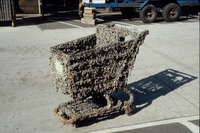Say Mac, Can You Help A Lake That's Down On Its Luck?
 How did Charlie Sykes put it, Bohica? Bend Over Here It Comes Again?
How did Charlie Sykes put it, Bohica? Bend Over Here It Comes Again?I was at JSonline today (I can read now that my hangover has lifted) and saw the story about our newest invasive species, the Quagga mussel. Most people in Wisconsin have seen the pictures of items covered in Zebra mussels...and have heard of intake maintenance nightmares for local companies.
Remember that? I guess those were the good old days.
The Quagga mussel has all but wiped out the zebra mussel within a few years' time. That's not good, there are zillions more quaggas than we ever had of zebras, and the damage they do is scores worse.
I'm starting to wonder if the conclusions I've had over the years about the horrible stench at the beach were misguided. Apparently the Quaggas filter all of the plankton out of the nearshore areas and this causes the rancid algae that builds up along the shores and the beaches. The past five years in particular have been some of the stinkiest times I can remember along the lake, and apparently, that rise has been concurrent with the rise in Quaggas. The JS Online article features an interview with Tom Nalepa, a researcher at the National Oceanic and Atmospheric Administration's Great Lakes Environmental Research Laboratory:
Nalepa says a recent survey of 160 sites across Lake Michigan show a complete flip-flop in the invasive mussel population. In 2000, zebra mussels made up 98.3%. In 2005, quaggas made up 97.7%.
But Nalepa says a more worrisome figure is the "stunning increase" in the number of overall invasive mussels now found on the lake bottom.
In 2000, Nalepa says, his survey showed an average of 899 zebra mussels per square meter of lake bottom at those 160 sites. Quagga mussels now average 7,790 per square meter of lake bottom.
That IS a stunning increase. And apparently these critters, unlike the zebra, can colonize in almost any conditions (except mud, which Lake Michigan has little of) including very deep cold waters. Here is one effect observed on fishing:
University of Michigan researcher David Jude says a research expedition netting fish off Lake Michigan's eastern shore last month yielded a surprise catch. "We probably had a half-pound of fish and 600 or 700 pounds of quaggas. . . . I could barely get it in the boat," Jude says.
That came after dragging a net for 10 minutes across the bottom of the lake at a depth of about 300 feet - too deep for other invasive mussels.
This is one susceptible lake that's down on it's luck. Many more invasive species are in the waters that we don't hear about such as the Sea Lamprey (attaches to fish and sucks out its fluids, eventually killing the fish) which have in recent years been somewhat brought under control and of course, Asian Carp. I think the Asian Carp are going to be a very big problem if they manage to get through the much-debated barrier in Chicago. I'm not sure any price is too high to protect Lake Michigan from this terrible fish.
This is a very good article about invasive species in fresh waterways.
I guess my purpose of this post is more to inform, I have no idea how invasive species can be controlled outside of not bringing them here in the first place. We have a lot of issues that look similar to this though. Think about it.



2 Comments:
Many show up in Ocean vessels, either attached to the outside hull or in the ballast water. Short of halting ocean vessels from entering the Ste. Lawrence seaway, too late.
Right, they were also talking about passing some type of legislation regarding the dumping of ballast water but all I can think of is MMSD dumping... easier to apologize than to try to prevent.
Enregistrer un commentaire
<< Home